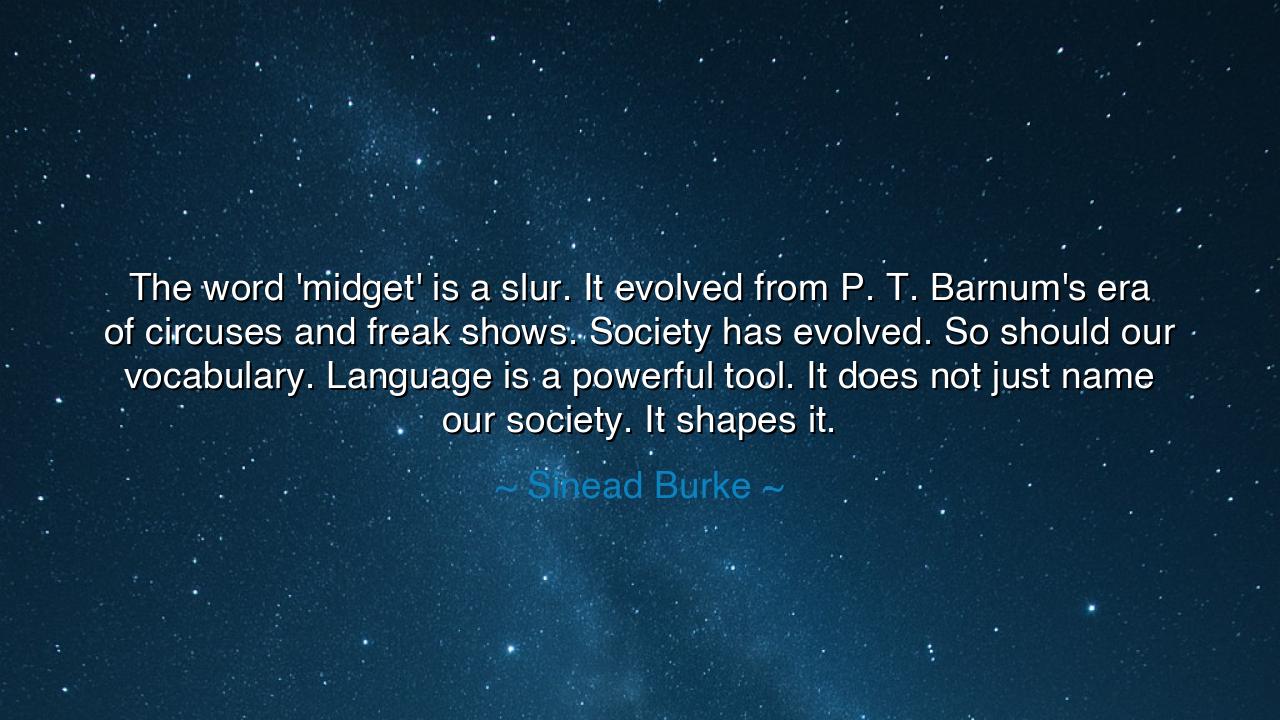
The word 'midget' is a slur. It evolved from P. T. Barnum's era
The word 'midget' is a slur. It evolved from P. T. Barnum's era of circuses and freak shows. Society has evolved. So should our vocabulary. Language is a powerful tool. It does not just name our society. It shapes it.






Hear the voice of Sinéad Burke, advocate, teacher, and prophet of dignity: “The word 'midget' is a slur. It evolved from P. T. Barnum's era of circuses and freak shows. Society has evolved. So should our vocabulary. Language is a powerful tool. It does not just name our society. It shapes it.” These words are not the shallow cries of fashion or politeness, but the revelation of a truth as old as civilization itself: that the words we speak are seeds, and from them grow either gardens of respect or weeds of scorn. What we call one another is not harmless—it creates the world in which we dwell.
The origin of this teaching is both historical and personal. In the 19th century, men like P. T. Barnum paraded human beings as curiosities, reducing them to their physical differences, making them spectacles for profit. The term “midget” arose in this cruel age, not as a neutral description but as a label of mockery and dehumanization. Burke reminds us that though centuries have passed, echoes of this degradation remain when such words are used. Just as society has shed the shackles of other injustices, so too must we let language evolve to honor the humanity of those once diminished by it.
The ancients, too, knew that words hold immense power. In the beginning of Genesis, creation itself is spoken into being: “Let there be light.” By word, the world was formed. Likewise, the Greeks believed in logos, the word that held reason and order together. To misuse words is to misuse this divine gift; to turn them into tools of mockery is to distort their sacred power. Thus Burke’s teaching reminds us: words are not mere sounds, but forces that mold society itself.
History bears witness to the transformative power of language. Consider the long struggle against racial slurs in America. For centuries, derogatory terms were used to degrade and control African Americans, reinforcing systems of inequality. But as language changed—through protest, education, and resistance—so too did the consciousness of a people. The banning of certain words did not end racism, but it marked a step, a declaration that language would no longer be allowed to enslave minds. Just so, Burke calls us to recognize that rejecting the word “midget” is not fragility, but the planting of justice in speech.
The meaning of Burke’s words is therefore profound: language not only reflects society—it shapes it. When we choose our words carelessly, we reinforce cruelty and exclusion. When we choose them wisely, we lay the foundation for respect, empathy, and dignity. A slur is never just a word; it is a blade that cuts into identity, reminding the vulnerable of old wounds. But words of respect can be balm, affirming that every person is seen as fully human.
What lesson shall we, who hear these words, take for ourselves? That vigilance over language is not weakness but wisdom. We must ask ourselves: do my words lift others up or press them down? Do they honor or diminish? We must educate ourselves on the origins of the terms we use, for ignorance can wound as deeply as malice. And we must be willing to let go of words whose roots are in cruelty, no matter how casually they were once spoken. For in releasing them, we release society from the chains of old prejudice.
Therefore, children of the future, inscribe this teaching upon your hearts: language is the architect of the world. Do not wield it carelessly, for it builds or destroys, includes or excludes, heals or harms. Let your words be chosen with reverence, for in them lies the power to shape how others see themselves and how you see the world. If society has evolved, let your vocabulary evolve with it. For in every just word spoken, you plant the seeds of a better, kinder, and more enduring civilization.






AAdministratorAdministrator
Welcome, honored guests. Please leave a comment, we will respond soon